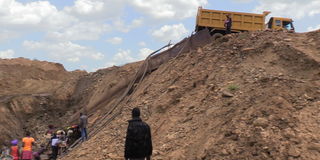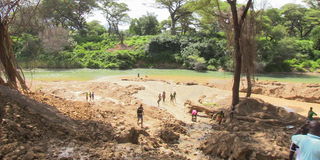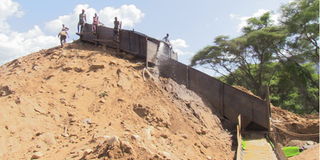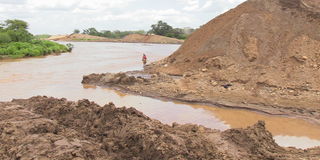Gold mining sparks renewed tensions on Turkana-West Pokot Border

The mining sites at Lami Nyeusi area in West Pokot County on May 31, 2025.
Control over gold mines along the Turkana-West Pokot border has reignited conflict between communities on both sides of the border who are diversifying their livelihoods through informal mining activities.
The border region has long been characterised by inter-ethnic conflict, primarily due to competition over scarce resources such as water and pasture, as well as disputed boundaries.
These conflicts have resulted in a significant loss of life, displacement, and economic disruption, affecting the livelihoods of the mainly pastoralist communities.
Frequent peace meetings and drone surveillance in support of Operation Maliza Uhalifu — a multi-agency security initiative led by the National Police Service and the Kenya Defence Forces aimed at flushing out bandits — have helped to pacify the border.
“Relative peace has enabled us to diversify our livelihoods by engaging in farming and artisanal gold mining at Lami Nyeusi, Kainuk, and Lorogon areas. Through peaceful coexistence, we’ve all been meeting at the mining sites,” said Mr Michael Lokiru.

The mining sites at Lami Nyeusi area in West Pokot County on May 31, 2025.
Gold mining activities have revived Kainuk town, attracting investors from across the country.
“Hotels and accommodation businesses in the border town that primarily depended on motorists are now booming. The town is characterised by long queues of trucks, bulldozers, and excavators used by miners,” Mr Lokiru added.
However, he noted that some people from neighbouring communities, whom he referred to as "peace spoilers", now want to take full control of the sites at Lami Nyeusi village, with some engaging in illegal activities.
“Miners from our neighbouring Turkana community are being turned away and even pelted with stones once they cross River Malmalite to access mining areas. Private investors are also being forced to work only with groups from the other community. This situation has exacerbated tensions and conflicts at the border,” he said.
Mr Lokiru called on local leaders and security personnel to intervene at the Lami Nyeusi site and restore peaceful coexistence before the conflict escalates to the point of killing, displacing people and disrupting transport activities.

The mining sites at Lami Nyeusi area in West Pokot County on May 31, 2025.
Aroo Deputy County Commissioner Yusuf Salat said that no capital offences related to banditry have been reported at the border in the past year, during which time residents have shifted towards diverse economic activities.
“We are coordinating with our West Pokot counterparts to talk to miners along the border, encouraging them to embrace peace. We have also established structures to resolve conflicts amicably,” Mr Salat said.
James Echuchuka, a resident of Kainuk, urged the authorities from both communities to remain impartial when dealing with gold mining-related conflicts. He stressed the need to arrest and prosecute individuals engaging in criminal acts, including the attack of miners.
He also appealed to the Ministry of Interior to lift the prolonged curfew, which has been in place for more than two years, and to enhance local surveillance instead by deploying national police reservists. This, he said, would enable locals to engage freely in farming, business and artisanal gold mining.

The mining sites at Lami Nyeusi area in West Pokot County on May 31, 2025.
Katilu Ward Representative MCA William Etubon stated that most of the locals, who were formerly pastoralists, had established new gold mining sites in the Lami Nyeusi, Kainuk, and Lorogon areas, and were relying on mining to rebuild their livelihoods.
“With increased security patrols, it will be easier to deal with regrouping bandits, who are now targeting camels and cattle at Keekunyuk and Katilu villages, as well as those planning raids on gold mining sites,” Mr Etubon said.


